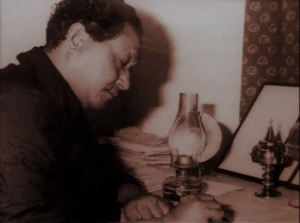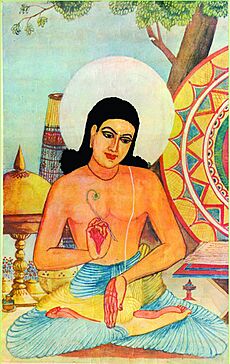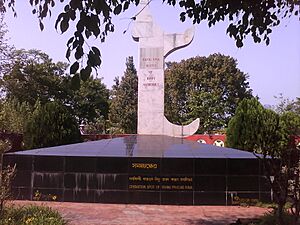Bishnu Prasad Rabha facts for kids
Quick facts for kids
Bishnu Prasad Rabha
|
|
|---|---|

Bishnu Prasad Rabha in the 1950s
|
|
| Born | 31 January 1909 |
| Died | 20 June 1969 (aged 60) |
| Other names | Kalaguru, Sainik Silpi |
| Alma mater | Calcutta University |
| Occupation |
|
| Years active | 1909–1969 |
| Political party | Revolutionary Communist Party of India |
Bishnu Prasad Rabha (1909–1969) was a very important person from Assam, India. He was known for his amazing talents in music, dance, painting, and writing. People also knew him as a strong leader who fought for what he believed in.
He loved the culture of his people and used traditional music and dance in his work. The people of Assam lovingly called him Kalaguru (which means "the master of the arts"). Some also called him Sainik Silpi (meaning "soldier artist") because he was part of a group that worked for social change.
Contents
Early Life and Fight for Freedom
Bishnu Prasad Rabha was born in Dacca, which was part of British India at the time, on January 31, 1909. His mother was Gethi Mech and his father was Raibahadur Gopal Chandra Mushahary, who worked for the British police. He was born into a Bodo family. However, he was raised by a Rabha family, so he took on the 'Rabha' surname.
Bishnu Rabha went to school in Tezpur and later studied in Calcutta. He was a bright student, but he also cared deeply about India's freedom.
From a young age, he was involved in the fight for India's independence from British rule. He was inspired by ideas about helping all people, especially those who were struggling. He believed that true freedom meant more than just being free from British rule. He wanted everyone to be free from poverty and unfairness. He once said, "I am fighting for a revolution from the realm of necessity to the realm of freedom." He spent his whole life working for this kind of freedom.
He even gave away a large piece of land (about 2500 bigha) that his family owned. He believed that "Haal Jaar Maati Taar," which means "those who farm the land should own it." Today, Tezpur University stands on some of the land he donated. He was always moving around, talking to people, and inspiring them with his speeches. He wanted power to be in the hands of ordinary people.
Even though he was a freedom fighter, he also loved to learn and research. He had to leave college because the police often raided his hostel due to his involvement in the freedom movement.
His Amazing Cultural Influence

Bishnu Prasad Rabha was known as the Kala Guru because of his huge impact on culture. Even today, many music competitions in Assam have a special section for his songs, called Bishnu Rava Sangeet.
He was a wonderful singer and composed over a hundred songs. These songs are known as Bishnu Rava Sangeet. They talk about many things, like the beauty of nature, how farmers were treated unfairly, and the struggles of workers. His songs also show his revolutionary ideas and India's fight for real freedom. Many of his songs are still popular with children today.
He believed it was important to understand and respect other cultures, ideas, and religions. He dreamed of a world where everyone lived together peacefully.
His famous songs include "Para jonomor khubho logonor," "logon ukali gol," and "roi roi keteki." He was also a great actor and performed in plays at the Baan theatre in Tezpur. He even translated the famous revolutionary song "Internationale" into Assamese. His beautiful paintings are still kept at his home in Tezpur.
Theatre and Films
Bishnu Rabha was very involved with the Baan theatre in Tezpur. Many of his plays were performed there. He used his acting skills to teach people, not just to become famous. Even though he knew many people in the film industry in Kolkata and Mumbai, he chose to stay in Assam. He also helped make the first Assamese film, Joymoti. He was also a film director and composed music for films like Siraj.
Awards and Tributes
Bishnu Prasad Rabha's songs are specially recognized as 'Rabha Sangeet'. The government of Assam gives an award in his honor to people who achieve great things in culture and music.
Kalaguru Bishnu Rabha Award
The Bishnu Rabha Award is given out every year to honor his memory and his ideals. In 2016, the award was given to artist Girish Chandra Bora and dancer Bipul Das. Each winner received 100,000 rupees and a special certificate.
The Chief Minister of Assam, Sarbananda Sonowal, spoke at the event. He talked about how important Bishnu Prasad Rabha's ideas were for uniting different communities. He also said that the government would create a special plan to help artists. He encouraged young people to learn from Bishnu Rabha's values to help Assam grow.
Girish Chandra Bora said that the award would inspire him to continue his work. He mentioned that Bishnu Prasad Rabha's contributions to literature and culture had always been a great inspiration for him. Sarod maestro Amjad Ali Khan also spoke, remembering Bishnu Rabha's many talents and his love for his country. He reminded everyone that music is for everyone and does not belong to any single religion.
Memorial Park
The Bishnu Rabha Smriti Udyan is a special memorial park built in his honor. It is located near the Bhairabi Temple in Tezpur, right by the Brahmaputra River.
His middle son, Hemraj Rabha, started building the park to pay tribute to his father. Later, the government of Assam took over the project. The park is where Bishnu Rabha was cremated. It also has sculptures on its walls that show some of his famous works. The park is now a popular place for people to visit and pay their respects to the great artist.
See also
- Assamese cinema
- Culture of Assam



